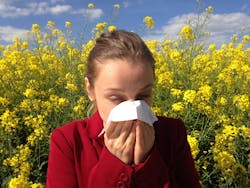Past allergies should not dissuade people from COVID-19 vaccination
Having a history of allergic reactions, experts say, is rarely a reason to avoid getting vaccinated. Lyda Cuervo Pardo, M.D., a University of Florida Health allergist and immunologist and an assistant professor in the UF College of Medicine’s division of rheumatology and clinical immunology, talks about why allergies should not stand in the way of getting vaccinated.
People with a history of an allergic reaction to a medication, a food, an environmental allergen such as pollen, trees, weeds, dust mites, even those with a history of an allergic reaction to latex or venoms like a bee sting, are very unlikely to have an allergic reaction to one of the COVID-19 vaccines. Patients with a history of an allergic reaction, even a severe reaction, should not be concerned about getting vaccinated.
People should remember the COVID vaccines do not contain eggs, gelatins, preservatives or latex, some of the things people often worry about when it comes to allergies.
If there’s ever a concern about your candidacy to receive a COVID-19 vaccine, the best advice is to see a board-certified allergist and immunologist so they can determine if it’s safe for you.
In very rare cases, someone might be allergic to an ingredient in the Pfizer and Moderna vaccines called polyethylene glycol. This same ingredient is found in many common medications. It’s in MiraLAX, for example, a medication commonly used to treat constipation.
The Johnson & Johnson vaccine doesn’t contain polyethylene glycol. But it has an ingredient known as polysorbate. Again, cases of an allergic reaction to this are very rare.
If you have a known allergy to these or other ingredients of any vaccine, you should consult with your doctor before getting vaccinated. If indicated, you might be referred to an allergist-immunologist. They can help you determine if you are still a candidate for a vaccination even with your history.
If you are allergic to polyethylene glycol, you might not be able to receive an mRNA vaccine — the Pfizer and Moderna vaccines. But you should discuss with your doctor if instead you would be a candidate for the Johnson & Johnson vaccination.
If you have a known allergy to polysorbate in the Johnson & Johnson vaccine, ask your doctor if you can get an an mRNA vaccine.
Tens of millions of Americans have now safely received COVID-19 vaccinations, and reports of serious allergic reactions are extraordinarily uncommon. Serious reactions to the vaccines have been reported, on average, at about 4.7 for every million doses of the Pfizer vaccine administered. In the case of Moderna, it’s 2.5 cases of reaction, also known as anaphylaxis, per million doses.
A lot of patients who come to me worry that their normal allergy symptoms, like their seasonal allergies, might be perceived by those around them as signs that they have COVID-19. Or the patients might be worried themselves that these sort of minor allergy symptoms might be COVID-19. And they are correct: Sometimes it can be difficult to establish the difference when you’re just having regular congestion or a runny nose from allergies.
I tell people to watch for more serious symptoms, such as fever, headaches — symptoms that are normally not present with allergies. They should, of course, be concerned if there is a lack of improvement even after they take their regular allergy medications. That’s when they should be thinking about getting tested for the coronavirus.

